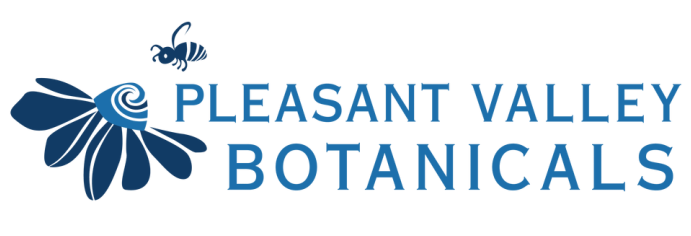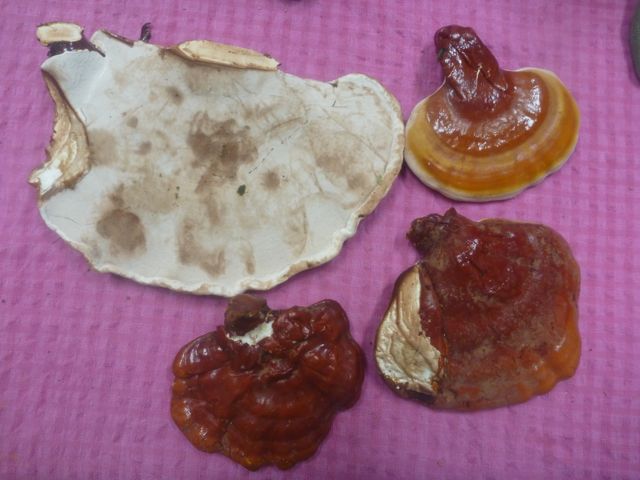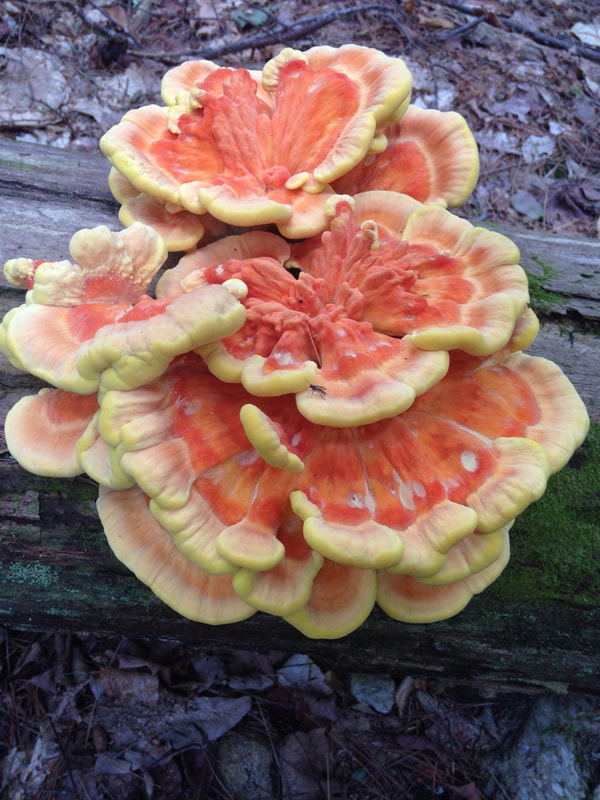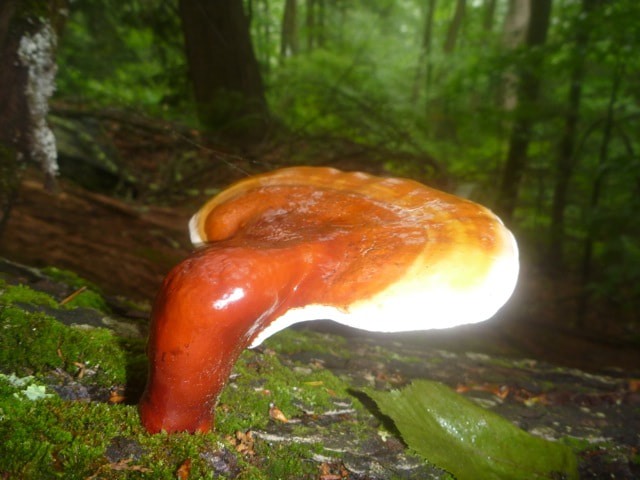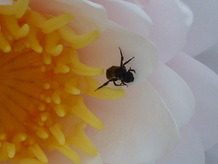THIS IS HANDOUT FOR 2024 NOFA CONFERENCE TALK ON GROWING MEDICINAL HERBS WITH A FOCUS ON SEED SAVING
| growyourownapothecary2024seedsaving.pages | |
| File Size: | 743 kb |
| File Type: | pages |
VIRIDITAS
Roughly translated, viriditas means green truth or vitality. The medieval seer Hildegard von Bingen used the term Viriditas to reflect nature’s divine healing power, as a term to describe a being's essence, and the interconnectedness of the natural world, humanity, and the divine. Below are some community groups and resources on pollinators, fungi, herbal medicine, farming, and holistic health care.
POLLINATOR RESOURCES:
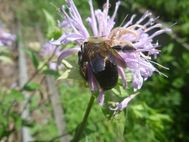
Many folks are aware of the "plight of the pollinators"- the dramatic decline of bees and other native insects, such as the Monarch butterflies. Some researchers believe Monarchs likely will go extinct, as there has been a 80-90% decline of the population in the Northeast, and 97% decline of the California population. While a lot of the information about "save the bees" talks about their role in agriculture and the pollination of some of our favorite food crops, I think it is also important to never forget that our insect friends have intrinsic value, and ecosystem roles way beyond our understanding.
While the decline of insects including bees and butterflies is multi-factorial, major causes are the increased use of pesticides and herbicides (like Round-Up/glyphosate), environmental pollution and habitat loss. While insect friendly landscaping alone wont solve the problem, many native bees and insects travel much shorter distances to feed than honey bees, and having native and pollen/nectar rich food sources is one of many steps humans can take. Some tips for creating insect friendly yards and gardens:
While the decline of insects including bees and butterflies is multi-factorial, major causes are the increased use of pesticides and herbicides (like Round-Up/glyphosate), environmental pollution and habitat loss. While insect friendly landscaping alone wont solve the problem, many native bees and insects travel much shorter distances to feed than honey bees, and having native and pollen/nectar rich food sources is one of many steps humans can take. Some tips for creating insect friendly yards and gardens:
- Use no pesticides and herbicides on your lawn- even organic approved can be fatal to desirable insects
- ASK when purchasing plants if they are treated with systemic insecticides ("neonics") as these will be fatal to any insect that visits the plant
- Protect and expand nest sites such as leaving sandy ground, snags and brush piles
- Offer host plants for larva (caterpillars). Example would be: growing a few extra plants of fennel, dill or parsley for the Swallowtails, or Milkweed for the Monarchs
- Time mowing to leave dandelions and other flowering lawn ground covers available during bloom
- Plant a diversity of blooms, trying to have a variety of shapes and plant families, as well as flowering throughout the entire season
- Plant in blocks or units, ideally eight or more of one plant species
- Offer a fresh, clean water source
- Cultivate a sense of non-traditional lawn beauty, for example finding spaces for unruly native Goldenrods and Asters to thrive
| pollinatortalk2018handout.docx | |
| File Size: | 112 kb |
| File Type: | docx |
FUNGI RESOURCES:
|
A great starting place to learn about Radical Mycology
|
The Role of Soil Fungi in Regenerative Agriculture: Soil Fungal Inoculants Impacts on Crop Yield, Nutrition and
Basil Downy Mildew (2017-2018).
Comparison of indigenous microorganism and commercial inoculants on crop yield and basil downy mildew disease resistance.
Grant summary: A healthy population of soil microorganisms can increase crop yields and disease resistance by improving the release and transport of nutrients, producing soil stabilizing humic compounds, creating symbiotic relationships that can improve plants’ resistance to pathogens, and improving abiotic stress tolerance. However, it remains unclear how to utilize these microorganisms to best achieve these results on small polyculture farms. The experiment will compare yields of five marketable crops (onion, fennel, ashwagandha, sweet basil, and parsley) under three treatment conditions at time of transplantation: untreated control seedlings, seedlings treated with commercial mycorrhizal inoculant, and seedlings treated with a simplified on-farm produced IMO (Indigenous Micro-Organism) inoculant. In addition to measuring crop yields, a similar treatment design will also be used to measure resistance to downy mildew disease in sweet basil; basil downy mildew has become a significant disease in many New England organic farms leading to total crop loss. This study will clarify the wide variability in results from previous studies that have used commercial and IMO inoculants. Further, this study will provide data on a wider variety of crops, and a simplified on-farm protocol for IMO inoculant based on a Korean Natural Farming method.
Grant summary: A healthy population of soil microorganisms can increase crop yields and disease resistance by improving the release and transport of nutrients, producing soil stabilizing humic compounds, creating symbiotic relationships that can improve plants’ resistance to pathogens, and improving abiotic stress tolerance. However, it remains unclear how to utilize these microorganisms to best achieve these results on small polyculture farms. The experiment will compare yields of five marketable crops (onion, fennel, ashwagandha, sweet basil, and parsley) under three treatment conditions at time of transplantation: untreated control seedlings, seedlings treated with commercial mycorrhizal inoculant, and seedlings treated with a simplified on-farm produced IMO (Indigenous Micro-Organism) inoculant. In addition to measuring crop yields, a similar treatment design will also be used to measure resistance to downy mildew disease in sweet basil; basil downy mildew has become a significant disease in many New England organic farms leading to total crop loss. This study will clarify the wide variability in results from previous studies that have used commercial and IMO inoculants. Further, this study will provide data on a wider variety of crops, and a simplified on-farm protocol for IMO inoculant based on a Korean Natural Farming method.
Please feel to email me, via the contact page, with any questions about this research project, other resources or the methods used. Below is a copy of a partial bibliography, a handout from my presentations on this research (which includes IMO instructions), and a copy of a recent article published on the topic and my final research grant report.

This project supported in part by the Northeast Sustainable Agriculture Research and Education (SARE) program. SARE is a program of the National Institute of Food and Agriculture, U.S. Department of Agriculture.
|
|
Two short videos from our own Radical Doug from the Westchester Bionutrient Food Association. The two videos really go together on quick, low cost ways making a fungal inoculant for farm or garden. The first is on collecting the IMO (Indigenous Microorganism) and the second about how to add to plants. Thanks for sharing these for all, Doug!
Harvesting IMOs https://www.youtube.com/watch?v=WNEEhN3IzuU Making IMO tea https://www.youtube.com/watch?v=AzKeF2zB_D8... | ||||||||||||||||||||||||
HERBAL RESOURCES:
|
It was hard for me to decide- should I place The Institute of Sustainable Nutrition under herb, agriculture or health care resources- because it belongs under all three! TIOSN is a program in nutrition, soil re-mineralization, growing food/herbs, foraging, culinary skills, kitchen medicine and how they are all rooted in our sustainable health. Plus Joan, Nigel and the TIOSN are awesome!
With the plethora of misinformation about herbs on the internet, a few well chosen herbal books are essential. You can't go wrong with any of Rosemary Gladstar's books.
Randomly, here is a link to a great article about Spilanthes, that I reference enough I am just leaving permanently up on the website.
|
Twin Star Herbal Education in New Milford, CT offers community classes and workshops on herbal medicine, holistic health, and natural healing. Connecticut's School of Herbal Studies director Lupo Passero is a skilled herbalist and wonderful educator, and I give my highest recommendation to any of her educational offerings.
United Plant Savers' mission is to protect native medicinal plants of the United States and Canada and their native habitat, while ensuring an abundant renewable supply of medicinal plants for generations to come.
Two resources from United Plant Savers:
1. Forest Farmers Handbook (free ebook) 2. Audio for growers track classes from International Herb Symposium. Friend Andrea Boneset produced this short video on the joys and challenges of building a veggie and herb garden. I found it snort-out-loud funny.
https://www.youtube.com/watch?v=8Nxr9XL7sxI#action=share | ||||||
FARMING RESOURCES:
|
CT NOFA, Northeast Organic Farmers Association is a grassroots organization working for organic food, farming, gardening and land care in Connecticut. They have many classes, conferences and resources connecting people in the local sustainable food and land care movements with organic resources and education. Stay tuned for their Winter Conference, I'll likely be teaching a session there.
The Hartford Chapter of the Bionutrient Food Association has many excellent resources and free or low cost talks.
The Sustainable Agriculture Research and Education program has great resources for gardeners and farmers, as well funds research grant program.
|
Holcomb Farm is a 367 acre working farm and community gathering place in Granby CT. Activities at the Farm center around education, agriculture, arts and passive recreation. Among their programs, they also offer a vegetable herb CSA and their Fresh Access Program. I can personally vouch for their veggies!
The New CT Farmer Alliance is a state wide network of farmers and growers. They work to identify and help develop support systems to nurture a successful and diverse agricultural landscape in Connecticut.
Seed Savers Exchange is a non-profit organization dedicated to saving and sharing heirloom seeds. You can purchase or swap seeds with fellow members around the world!
|
The Open Food Network is the ordering platform I choose for the farmlet. Here are some of their ethics:
Global Commons: Everyone in the community co-creates and shares responsibility for our global commons (the OFN platform, but more generally, the air, water, soils, etc.).
Relationships: We realise that the nature of our relationship with our food is at the foundation of our relationship with life itself, and that this relationship reflects the spirit of our existence.
Ecosystems: We support farmers and producers moving towards regenerative forms of agriculture, that (re)build resilient natural systems, taking into account the soil, air, water and biodiversity of our planet.
Transparency: We believe in transparency, both in the platform we build and the organisation that supports it.
Empowerment: Our project empowers people to create the life they want for themselves; and gives people a real say in their food system.
Subsidiarity: Problems are best solved at the lowest appropriate level of subsidiarity.
People First: We build a people system. Care and empathy for each other lie at its heart, celebrating solidarity, diversity, inclusivity and tolerance.
Constant Evolution: We live in a perpetually evolving world, which requires constant adaptation and agility.
Systemic Change: We believe in a global transition that addresses the root cause of current ills, not its symptoms.
Global Commons: Everyone in the community co-creates and shares responsibility for our global commons (the OFN platform, but more generally, the air, water, soils, etc.).
Relationships: We realise that the nature of our relationship with our food is at the foundation of our relationship with life itself, and that this relationship reflects the spirit of our existence.
Ecosystems: We support farmers and producers moving towards regenerative forms of agriculture, that (re)build resilient natural systems, taking into account the soil, air, water and biodiversity of our planet.
Transparency: We believe in transparency, both in the platform we build and the organisation that supports it.
Empowerment: Our project empowers people to create the life they want for themselves; and gives people a real say in their food system.
Subsidiarity: Problems are best solved at the lowest appropriate level of subsidiarity.
People First: We build a people system. Care and empathy for each other lie at its heart, celebrating solidarity, diversity, inclusivity and tolerance.
Constant Evolution: We live in a perpetually evolving world, which requires constant adaptation and agility.
Systemic Change: We believe in a global transition that addresses the root cause of current ills, not its symptoms.
